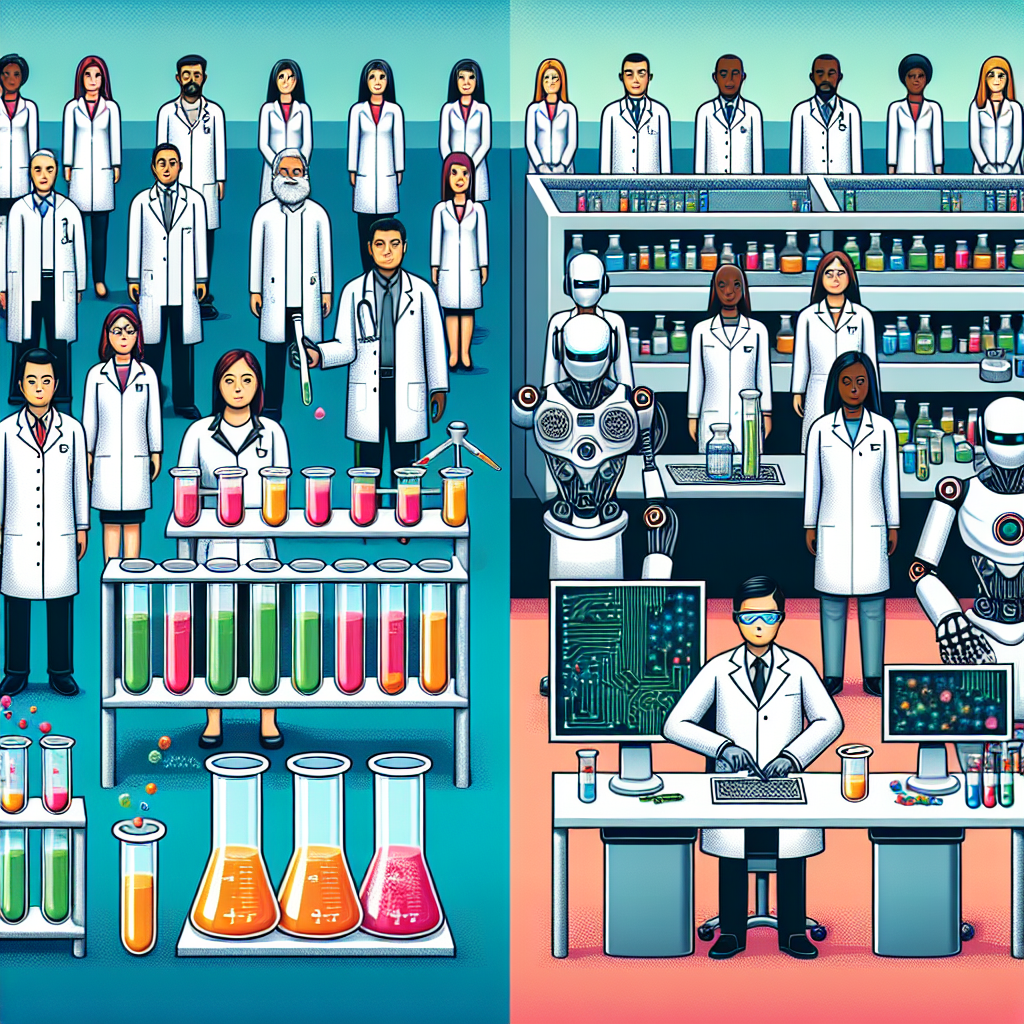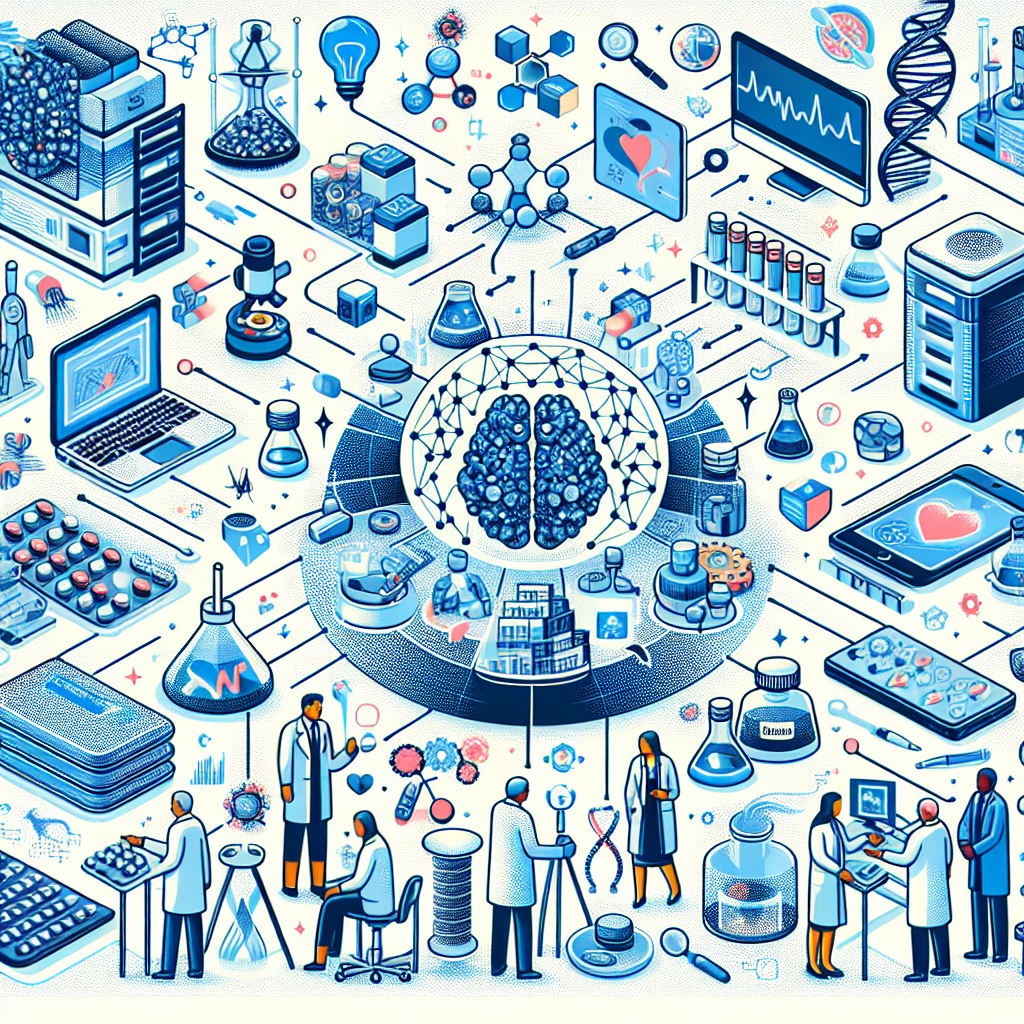How AI is Transforming the Pharma Industry

Discover how AI is revolutionizing the Pharma Industry! Learn about the latest advancements, the impact on drug discovery, and much more. Don’t miss out on this technological revolution. Click here to explore more.
Exploring the Impact of AI on Drug Discovery in the Pharma Industry
Artificial Intelligence (AI) is revolutionizing various sectors, and the pharmaceutical industry is no exception. The advent of AI in the pharma industry is transforming the way drugs are discovered, developed, and distributed. This article explores the profound impact of AI on drug discovery in the pharma industry.
Drug discovery is a complex, time-consuming, and expensive process. It involves identifying target diseases, discovering potential drug candidates, testing these candidates for efficacy and safety, and finally, getting regulatory approval. Traditionally, this process could take up to 15 years and cost billions of dollars. However, AI is poised to disrupt this traditional model by accelerating the drug discovery process and reducing costs.
AI algorithms can analyze vast amounts of data faster and more accurately than humans. They can sift through millions of chemical structures, identify potential drug candidates, and predict their properties and effects. This ability to process and analyze large datasets is particularly useful in the initial stages of drug discovery, where potential drug molecules are identified and screened. AI can significantly speed up this process, reducing the time it takes to identify promising drug candidates.
Moreover, AI can also help in predicting the success of a drug candidate. By analyzing data from previous clinical trials, AI can predict how a drug candidate will perform in future trials. This predictive capability can help pharmaceutical companies make more informed decisions about which drug candidates to pursue, thereby reducing the risk of costly failures.
AI is also transforming the way clinical trials are conducted. AI algorithms can help in patient recruitment by identifying suitable candidates for clinical trials. They can also monitor patients during trials, track their responses to the drug, and detect any adverse effects. This real-time monitoring can help in early detection of potential issues, thereby improving the safety and efficacy of clinical trials.
Furthermore, AI can also help in personalizing drug treatments. By analyzing a patient’s genetic data, AI can predict how the patient will respond to a particular drug. This can help in developing personalized drug treatments, which are more effective and have fewer side effects.
However, the use of AI in drug discovery also poses certain challenges. One of the main challenges is the quality and reliability of data. AI algorithms are only as good as the data they are trained on. If the data is inaccurate or biased, the predictions made by the AI will also be inaccurate or biased. Therefore, it is crucial to ensure the quality and reliability of data used in AI algorithms.
Another challenge is the ethical and regulatory issues associated with the use of AI in drug discovery. There are concerns about data privacy, consent, and the use of AI in decision-making. These issues need to be addressed to ensure the responsible use of AI in drug discovery.
In conclusion, AI is transforming the drug discovery process in the pharma industry. It is making the process faster, more efficient, and cost-effective. However, there are also challenges that need to be addressed. With the right policies and regulations in place, AI has the potential to revolutionize the pharma industry and improve patient care.
The Role of AI in Streamlining Clinical Trials in the Pharma Sector

Artificial Intelligence (AI) is revolutionizing various sectors, and the pharmaceutical industry is no exception. One of the most significant areas where AI is making a substantial impact is in streamlining clinical trials. Clinical trials are a critical component of the pharma sector, as they are instrumental in bringing new drugs to the market. However, they are also notoriously complex, time-consuming, and expensive. AI is now being leveraged to address these challenges and transform the way clinical trials are conducted.
AI’s role in streamlining clinical trials begins with patient recruitment. Traditionally, identifying suitable candidates for clinical trials has been a laborious process, often resulting in delays. AI can expedite this process by using machine learning algorithms to analyze vast amounts of data and identify potential participants quickly and accurately. This not only speeds up the recruitment process but also ensures a more diverse and representative sample, thereby enhancing the validity of the trial results.
Once the trial is underway, AI can be used to monitor patient adherence to the trial protocol. Non-adherence is a common issue in clinical trials, often leading to skewed results and wasted resources. AI can help mitigate this problem by using predictive analytics to identify patients who are likely to deviate from the protocol, allowing for timely intervention. Moreover, AI can also be used to monitor patients’ health in real-time, enabling researchers to detect any adverse reactions to the drug promptly.
AI also plays a crucial role in data analysis during clinical trials. The sheer volume of data generated during a trial can be overwhelming, making it difficult to identify patterns and draw meaningful conclusions. AI can help overcome this challenge by using advanced algorithms to analyze the data, identify trends, and predict outcomes. This not only speeds up the analysis process but also improves the accuracy of the results, thereby accelerating the drug development process.
Furthermore, AI can help in designing more efficient clinical trials. Traditionally, trial design has been a complex and time-consuming process, often involving a degree of trial and error. AI can streamline this process by using machine learning algorithms to predict the most effective trial design based on historical data. This can significantly reduce the time and cost associated with trial design, thereby making the entire process more efficient.
Finally, AI can also be used to improve the transparency and reproducibility of clinical trials. By using blockchain technology, AI can create a secure and immutable record of all trial data, ensuring that the results are reliable and can be independently verified. This not only enhances the credibility of the trial results but also promotes trust and confidence in the drug development process.
In conclusion, AI is playing a transformative role in streamlining clinical trials in the pharma sector. By automating laborious processes, improving accuracy, and enhancing transparency, AI is making clinical trials more efficient, reliable, and credible. As AI continues to evolve and mature, its impact on clinical trials and the broader pharma sector is likely to grow, heralding a new era of innovation and progress in drug development.
How AI is Revolutionizing Patient Care in the Pharmaceutical Industry
Artificial Intelligence (AI) is rapidly transforming various sectors, and the pharmaceutical industry is no exception. The advent of AI has brought about a revolution in patient care, significantly improving the efficiency and effectiveness of treatments. This article will delve into how AI is revolutionizing patient care in the pharmaceutical industry.
AI’s impact on patient care in the pharmaceutical industry is multifaceted. One of the most significant ways AI is transforming patient care is through personalized medicine. AI algorithms can analyze a patient’s genetic makeup, lifestyle, and environmental factors to predict their susceptibility to certain diseases. This information can then be used to develop personalized treatment plans that are more effective and have fewer side effects than traditional treatments.
Moreover, AI is also playing a crucial role in drug discovery and development. Traditionally, the process of discovering and developing new drugs is time-consuming and costly. However, AI can significantly speed up this process by analyzing vast amounts of data to identify potential drug candidates. This not only reduces the time and cost involved in drug discovery but also increases the chances of finding effective treatments for various diseases.
In addition, AI is also being used to improve clinical trials. AI can analyze data from previous trials to predict the outcomes of future trials, helping researchers design more effective trials. AI can also help identify suitable participants for clinical trials, ensuring that the trials are more representative of the population. This can lead to more accurate results and faster approval of new drugs.
Furthermore, AI is also transforming the way pharmaceutical companies interact with patients. AI-powered chatbots, for example, can provide patients with instant answers to their queries, improving patient engagement and satisfaction. These chatbots can also remind patients to take their medication, helping improve adherence to treatment plans.
AI is also helping improve patient monitoring. Wearable devices equipped with AI can monitor a patient’s vital signs and alert healthcare providers if there are any abnormalities. This can help detect health issues early, allowing for timely intervention and treatment.
However, despite the numerous benefits of AI, there are also challenges that need to be addressed. One of the main challenges is the issue of data privacy. As AI relies on large amounts of data, there are concerns about how this data is collected, stored, and used. It is crucial for pharmaceutical companies to ensure that they are complying with data privacy regulations to protect patient information.
Another challenge is the lack of understanding and trust in AI. Many people are wary of AI due to a lack of understanding of how it works. It is important for pharmaceutical companies to educate patients and healthcare providers about the benefits of AI and how it is used to improve patient care.
In conclusion, AI is revolutionizing patient care in the pharmaceutical industry. From personalized medicine to drug discovery, clinical trials, patient engagement, and monitoring, AI is transforming the way pharmaceutical companies care for patients. However, it is also important to address the challenges associated with AI to ensure its successful implementation in patient care. With the right approach, AI has the potential to significantly improve patient care in the pharmaceutical industry, leading to better health outcomes for patients.